The Best Foods for Your Hair
You've tried all of the intensive-conditioning masks in the world, but the problem may lie a little deeper. These foods could help you get the hair you want.
By Emma Haak
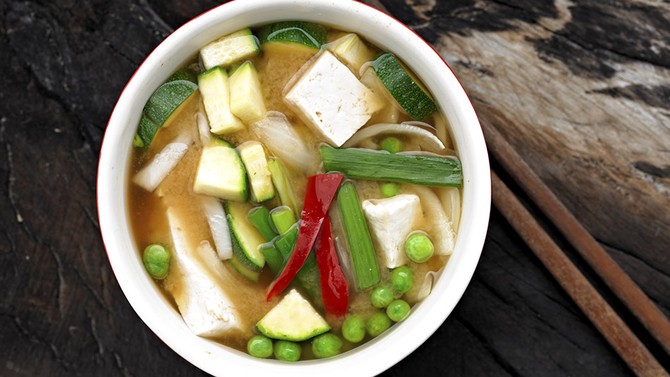
Photo: 4kodiak/iStock/Getty Images Plus
You want: More growth, and some shine wouldn't hurt
Try eating more: Probiotics
Inflammation can interfere with normal hair growth, and there's some research with animals suggesting that controlling inflammation by feeding your gut the right foods can counteract those damaging effects. A study in PLOS One reports that mice fed probiotics had more robust fur growth and shinier fur than mice in the control group, who didn't get any beneficial bacteria in their diets. Whitney Bowe, MD, a clinical assistant professor of dermatology at Mount Sinai Medical Center, in New York, recommends three servings per day of probiotic-rich foods and drinks like miso paste (found in miso soup), yogurt with live active cultures, kefir and kombucha.
Try eating more: Probiotics
Inflammation can interfere with normal hair growth, and there's some research with animals suggesting that controlling inflammation by feeding your gut the right foods can counteract those damaging effects. A study in PLOS One reports that mice fed probiotics had more robust fur growth and shinier fur than mice in the control group, who didn't get any beneficial bacteria in their diets. Whitney Bowe, MD, a clinical assistant professor of dermatology at Mount Sinai Medical Center, in New York, recommends three servings per day of probiotic-rich foods and drinks like miso paste (found in miso soup), yogurt with live active cultures, kefir and kombucha.
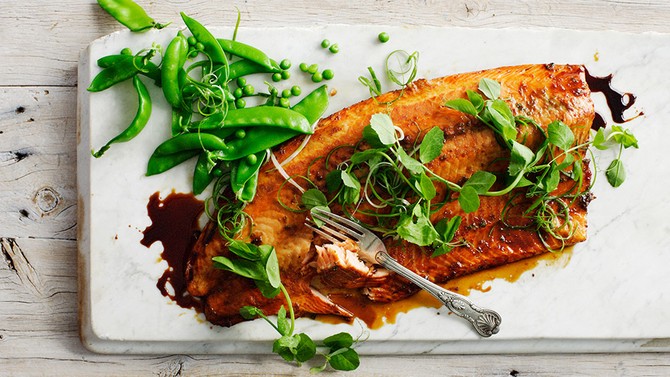
Photo: BRETT STEVENS/Cultura Exclusive/Getty Images
You want: Help for your thinning hair
Try eating more: Vitamin D
Too little D could be contributing to your thinning. Researchers from Cairo University in Egypt compared serum ferritin (a way of measuring your body's iron stores) and vitamin D levels in women with hair loss with women who had healthy heads of hair and found that levels of the vitamin were as much as 121 percent lower among those with thinning. About 25 percent of people over the age of 1 included in a National Health and Nutrition Examination Survey between 2001 and 2006 were at risk of having inadequate levels of the vitamin. To get more D in your diet (the RDA is 600 IU, or 15 mcg), try fish sources like salmon, sardines or canned tuna, or fortified dairy sources like milk and yogurt (look for ones specifically labeled as fortified with vitamin D).
Try eating more: Vitamin D
Too little D could be contributing to your thinning. Researchers from Cairo University in Egypt compared serum ferritin (a way of measuring your body's iron stores) and vitamin D levels in women with hair loss with women who had healthy heads of hair and found that levels of the vitamin were as much as 121 percent lower among those with thinning. About 25 percent of people over the age of 1 included in a National Health and Nutrition Examination Survey between 2001 and 2006 were at risk of having inadequate levels of the vitamin. To get more D in your diet (the RDA is 600 IU, or 15 mcg), try fish sources like salmon, sardines or canned tuna, or fortified dairy sources like milk and yogurt (look for ones specifically labeled as fortified with vitamin D).
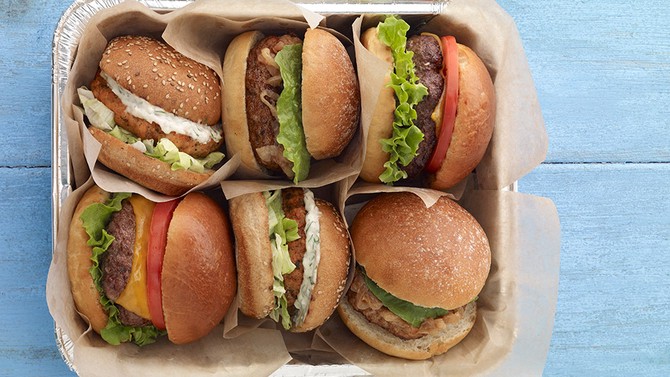
Photo: Rita Maas/Photolibrary/Getty Images
You want: More help for your thinning hair
Try eating more: Iron
If you're meeting your iron RDA (18 mg for women 19 to 50 years old and 8 mg for women 51 years and older), increasing your intake probably won't make a big difference. But if blood tests show that you're deficient, adding more iron to your diet may lead to a change for the better. When Korean researchers compared the serum ferritin levels of women with female-pattern hair loss to those without hair loss, they found that levels were an average of 45 percent lower among women losing their strands. Study author Jong Hee Lee, MD, at the department of dermatology at Sungkyunkwan University School of Medicine in Seoul, Korea, wrote in an email that his hair-loss patients have seen improvement with increases in iron intake. Your body absorbs iron from meat better than iron from plant sources, which is why the RDA for vegetarians is almost twice that for meat eaters, and beef is near the top of the list for iron content. Chicken and turkey are also good sources. For plant-based options, try beans, lentils or tofu. And keep in mind that it takes time for nutrient intake via food to affect hair growth, so stick with it for at least a few months to see any results, says Amy McMichael, MD, a professor and chair of the department of dermatology at Wake Forest Baptist Health, in Winston-Salem, North Carolina.
Try eating more: Iron
If you're meeting your iron RDA (18 mg for women 19 to 50 years old and 8 mg for women 51 years and older), increasing your intake probably won't make a big difference. But if blood tests show that you're deficient, adding more iron to your diet may lead to a change for the better. When Korean researchers compared the serum ferritin levels of women with female-pattern hair loss to those without hair loss, they found that levels were an average of 45 percent lower among women losing their strands. Study author Jong Hee Lee, MD, at the department of dermatology at Sungkyunkwan University School of Medicine in Seoul, Korea, wrote in an email that his hair-loss patients have seen improvement with increases in iron intake. Your body absorbs iron from meat better than iron from plant sources, which is why the RDA for vegetarians is almost twice that for meat eaters, and beef is near the top of the list for iron content. Chicken and turkey are also good sources. For plant-based options, try beans, lentils or tofu. And keep in mind that it takes time for nutrient intake via food to affect hair growth, so stick with it for at least a few months to see any results, says Amy McMichael, MD, a professor and chair of the department of dermatology at Wake Forest Baptist Health, in Winston-Salem, North Carolina.
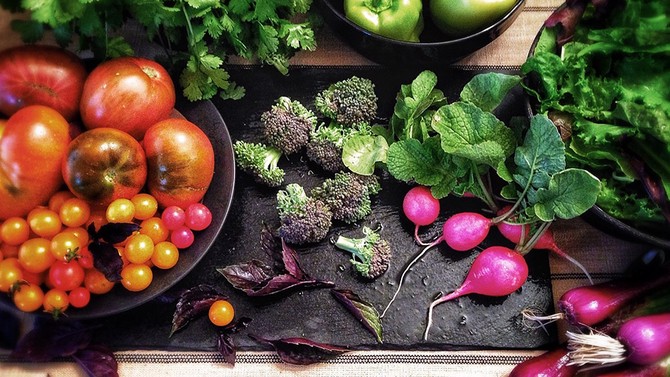
Photo: Anne Stephenson/EyeEm/Getty Images
You want: A thicker head of hair
Try eating more: Healthy fats and antioxidants
A recent study in the Journal of Cosmetic Dermatology suggests that the combination of essential fatty acids and free-radical-fighting antioxidants may have more benefits than either on their own. Of the 80 women who took a nutritional supplement containing a mix of omega 3 and 6 fatty acids and antioxidants including vitamins E, C and lycopene, more than 87 percent reported having more hair on their heads and more than 86 percent said their individual strands became thicker at the sixth-month mark. (The researchers excluded women with nutritional deficiencies or health disorders that may have been a factor in subpar hair growth or might have interfered with the study's results.) Several researchers on the study came from a company co-created by L'Oréal that manufactured and marketed beauty supplements, but their findings bolster Bowe's advice: A diet that includes healthy fats and antioxidants can only mean good things for your health—and your hair.
Try eating more: Healthy fats and antioxidants
A recent study in the Journal of Cosmetic Dermatology suggests that the combination of essential fatty acids and free-radical-fighting antioxidants may have more benefits than either on their own. Of the 80 women who took a nutritional supplement containing a mix of omega 3 and 6 fatty acids and antioxidants including vitamins E, C and lycopene, more than 87 percent reported having more hair on their heads and more than 86 percent said their individual strands became thicker at the sixth-month mark. (The researchers excluded women with nutritional deficiencies or health disorders that may have been a factor in subpar hair growth or might have interfered with the study's results.) Several researchers on the study came from a company co-created by L'Oréal that manufactured and marketed beauty supplements, but their findings bolster Bowe's advice: A diet that includes healthy fats and antioxidants can only mean good things for your health—and your hair.
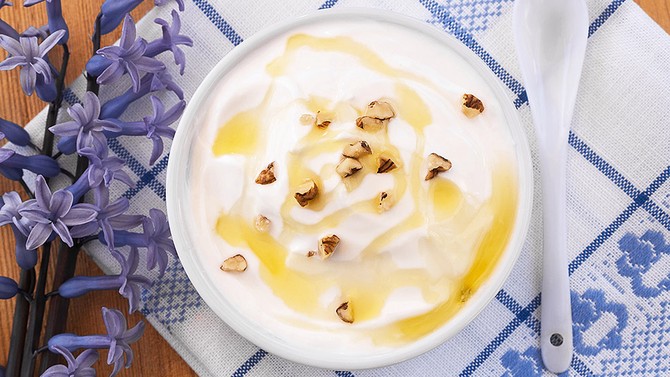
Photo: DejanKolar/iStock/Getty Images Plus
You want: More hair staying on your head
Try eating more: Protein
Most iron-rich foods are also good sources of protein, so if your iron intake is adequate, odds are your protein consumption is, too. But if you're getting a lot of your iron from relatively low-protein picks, like certain iron-fortified breakfast cereals, white rice or white bread, that may not be true. According to the American Academy of Dermatology, your body goes into rationing mode when protein intake is too low, and one of they ways the body cuts back on its protein needs is to shut down hair growth, resulting in hair loss. Once you get your protein intake back on track, your strands will follow suit. "It can take a little while to notice the effects of a lack of protein, but I see clients all the time who did a juice cleanse a month or two before they see me and now their hair is falling out," says Bowe. "And it's because there's usually no protein in those cleanses." Meeting the recommended intake of 46 grams per day for women is likely enough to maintain hair health. Getting a mix of lean meats (a 3-ounce piece of chicken, beef or pork generally has about 20 grams), eggs (a large one has 6 grams of protein), Greek yogurt (one non-fat container can pack up to 17 grams) and nuts (a small handful of almonds has 6 grams) will help you reach that goal.
Try eating more: Protein
Most iron-rich foods are also good sources of protein, so if your iron intake is adequate, odds are your protein consumption is, too. But if you're getting a lot of your iron from relatively low-protein picks, like certain iron-fortified breakfast cereals, white rice or white bread, that may not be true. According to the American Academy of Dermatology, your body goes into rationing mode when protein intake is too low, and one of they ways the body cuts back on its protein needs is to shut down hair growth, resulting in hair loss. Once you get your protein intake back on track, your strands will follow suit. "It can take a little while to notice the effects of a lack of protein, but I see clients all the time who did a juice cleanse a month or two before they see me and now their hair is falling out," says Bowe. "And it's because there's usually no protein in those cleanses." Meeting the recommended intake of 46 grams per day for women is likely enough to maintain hair health. Getting a mix of lean meats (a 3-ounce piece of chicken, beef or pork generally has about 20 grams), eggs (a large one has 6 grams of protein), Greek yogurt (one non-fat container can pack up to 17 grams) and nuts (a small handful of almonds has 6 grams) will help you reach that goal.
Published 06/22/2015

